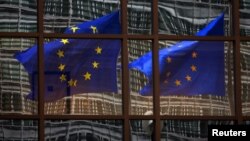European Union leaders will again try to draw Russia's neighbors closer at their Eastern Partnership summit starting Thursday in what has become a rite of geopolitical gamesmanship on the future of the continent.
The last summit with six eastern nations turned into a dramatic standoff over Ukraine, with then-leader Viktor Yanukovych suddenly withdrawing from signing an association with the EU and instead turning toward Moscow and President Vladimir Putin.
Since that meeting in Vilnius, Lithuania, the pro-EU government elected after Yanukovych's ouster has learned the costs of turning away from Moscow: Russia annexed Ukraine's Crimean Peninsula, large swathes of eastern territory bordering Russia are embroiled in conflict and the nation is in deep economic decline.
On the eve of this year's summit, Russia again drew the line how far neighbors could go.
“We don't see our neighbors' aspirations to strengthen ties with the European Union as a tragedy, but to make those processes develop positively they mustn't hurt the interests of the Russian Federation,” Foreign Minister Sergei Lavrov told the upper house of the Russian parliament.
For dinner Thursday, almost all of the EU leaders, including German Chancellor Angela Merkel and French President Francois Hollande will line up for sobering talks with their counterparts or top officials from Ukraine, Belarus, Georgia, Armenia, Azerbaijan and Moldova.
Putin will be nowhere in sight, but is still expected to dominate discussions.
Since the Iron Curtain came down, many former communist nations have been pulled out of Moscow's orbit, including summit host Latvia and Baltic neighbors Estonia and Lithuania _ former Soviet republics that are now EU and NATO members. Under the leadership of Putin, opposition has stiffened and turned into sometimes open political conflict.
Carl Bildt, then Sweden's foreign minister, was a key player at the Vilnius summit, seeing the hand of Moscow behind Ukraine's sudden about-face to dismiss the EU. He said the Riga summit will reaffirm ties between the EU and the post-communist states rather than yield any headline-grabbing new agreements.
“With everything from massive disinformation to tanks and soldiers thrown against the Eastern Partnership since 2013, just staying the course is a powerful sign of success,” Bildt wrote Wednesday on the Project Syndicate website for international opinion pieces.
Instead of a joint approach to the six nations, the EU must go forward with piecemeal action, since Armenia and Belarus have decided to join Moscow's Eurasian Economic Union.
Meanwhile, Belarus and its authoritarian leader Alexander Lukashenko have been kept at arm's length because of political and human rights complaints that earned the nation the moniker of the last dictatorship in Europe. Icy relations have somewhat warmed recently and Belarus is expected to send its highest delegation yet, though it won't include Lukashenko himself.




